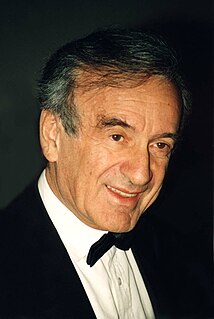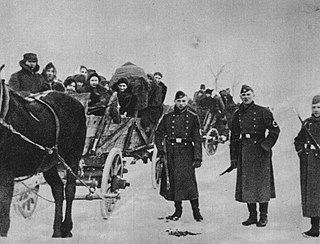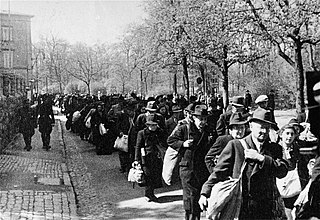
The Final Solution or the Final Solution to the Jewish Question was a Nazi plan for the genocide of Jews during World War II. The "Final Solution to the Jewish question" was the official code name for the murder of all Jews within reach, which was not restricted to the European continent. This policy of deliberate and systematic genocide starting across German-occupied Europe was formulated in procedural and geopolitical terms by Nazi leadership in January 1942 at the Wannsee Conference held near Berlin, and culminated in the Holocaust, which saw the killing of 90% of Polish Jews, and two-thirds of the Jewish population of Europe.

Nazi Germany used six extermination camps, also called death camps (Todeslager), or killing centers (Tötungszentren), in Central Europe during the Holocaust in World War II to systematically murder over 2.7 million people—mostly Jews—during the Holocaust. The victims of death camps were primarily killed by gassing, either in permanent installations constructed for this specific purpose, or by means of gas vans. The six extermination camps were Chelmno, Belzec, Sobibor, Treblinka, Majdanek and Auschwitz-Birkenau. Auschwitz and Majdanek death camps also used extreme work under starvation conditions in order to kill their prisoners.

Elie Wiesel was a Romanian-born American writer, professor, political activist, Nobel laureate, and Holocaust survivor. He authored 57 books, written mostly in French and English, including Night, a work based on his experiences as a Jewish prisoner in the Auschwitz and Buchenwald concentration camps.

Holocaust denial is an antisemitic conspiracy theory that asserts that the Nazi genocide of Jews, known as "the Holocaust", is a myth or fabrication. Holocaust deniers make one or more of the following false statements:
The Institute for Historical Review (IHR), founded in 1978, is an organization originally based in Torrance, California, United States, best known for publishing articles and books promoting Holocaust denial. It is considered by many scholars to be central to the international Holocaust denial movement. IHR promotes antisemitic viewpoints, and has links to neo-Nazi organizations. The IHR published the Journal of Historical Review until 2002, but now disseminates its materials through its website and via email. The parent corporation of the IHR and the affiliated Noontide Press is the Legion for the Survival of Freedom. The IHR is a registered nonprofit organization and donations to it are tax-free.

Schindler's List is a 1993 American epic historical drama film directed and produced by Steven Spielberg and written by Steven Zaillian. It is based on the 1982 historical fiction novel Schindler's Ark by Australian novelist Thomas Keneally. The film follows Oskar Schindler, a German industrialist who together with his wife Emilie Schindler saved more than a thousand mostly Polish-Jewish refugees from the Holocaust by employing them in his factories during World War II. It stars Liam Neeson as Schindler, Ralph Fiennes as SS officer Amon Göth and Ben Kingsley as Schindler's Jewish accountant Itzhak Stern.

David John Cawdell Irving is an English author and Holocaust denier who has written on the military and political history of World War II, with a focus on Nazi Germany. His works include The Destruction of Dresden (1963), Hitler's War (1977), Churchill's War (1987) and Goebbels: Mastermind of the Third Reich (1996). In his works, he argued that Adolf Hitler did not know of the extermination of Jews, or, if he did, he opposed it. Though Irving's negationist claims and views of German war crimes in World War II were never taken seriously by mainstream historians, he was once recognised for his knowledge of Nazi Germany and his ability to unearth new historical documents.

Belzec was a Nazi German extermination camp built by the SS for the purpose of implementing the secretive Operation Reinhard, the plan to eradicate Polish Jews, a key part of the "Final Solution" which entailed the murder of some 6 million Jews in the Holocaust. The camp operated from 17 March 1942 to the end of June 1943. It was situated about 500 m (1,600 ft) south of the local railroad station of Bełżec, in the new Lublin District of the General Government territory of German-occupied Poland. The burning of exhumed corpses on five open-air grids and bone crushing continued until March 1943.

Holocaust theology is a body of theological and philosophical debate concerning the role of God in the universe in light of the Holocaust of the late 1930s and 1940s. It is primarily found in Judaism. Jews were killed in higher proportions than other groups; some scholars limit the definition of the Holocaust to the Jewish victims of the Nazis as Jews alone were targeted for the Final Solution. Others include the additional five million non-Jewish victims, bringing the total to about 11 million. One third of the total worldwide Jewish population were killed during the Holocaust. The Eastern European Jewish population was particularly hard hit, being reduced by ninety percent. While a disproportionate number of Jewish religious scholars were killed, more than eighty percent of the world's total, the perpetrators of the Holocaust did not merely target religious Jews. A large percentage of the Jews killed both in Eastern and Western Europe were either nonobservant or had not received even an elementary level of Jewish education.

Cannibal Holocaust is a 1980 Italian cannibal film directed by Ruggero Deodato and written by Gianfranco Clerici. It stars Robert Kerman as Harold Monroe, an anthropologist from New York University who leads a rescue team into the Amazon rainforest to locate a crew of filmmakers. Played by Carl Gabriel Yorke, Francesca Ciardi, Perry Pirkanen, and Luca Barbareschi, the crew had gone missing while filming a documentary on local cannibal tribes. When the rescue team is only able to recover the crew's lost cans of film, an American television station wishes to broadcast the footage as a sensationalized television special. Upon viewing the reels, Monroe is appalled by the team's actions and objects to the station's intent to air the documentary.

The Holocaust – the murder of about six million Jews by Nazi Germany from 1941 to 1945 – is the best-documented genocide in history. Although there is no single document which lists all Jewish victims of Nazi persecution, there is conclusive evidence that about six million were killed. There is also conclusive evidence that Jews were gassed at Auschwitz-Birkenau, the Operation Reinhard extermination camps, and in gas vans, and that there was a systematic plan by the Nazi leadership to murder them.

The Boy in the Striped Pyjamas is a 2006 Holocaust novel by Irish novelist John Boyne. Much like the process he undertakes when writing most of his novels, Boyne has said that he wrote the entire first draft in two and a half days, without sleeping much, but also that he was quite a serious student of Holocaust-related literature for years before the idea for the novel even came to him. The book has received mixed reviews; while positive reviews praise the story as a moral, negative reviews attack the book's historical inconsistencies, and the potential damage it could cause to people's education about the Holocaust.

Peter Longerich is a German professor of history. He is regarded by fellow historians, including Ian Kershaw, Richard Evans, Timothy Snyder, Mark Roseman and Richard Overy, as one of the leading German authorities on the Holocaust.

The Holocaust, also known as the Shoah, was the genocide of European Jews during World War II. Between 1941 and 1945, Nazi Germany and its collaborators systematically murdered some six million Jews across German-occupied Europe, around two-thirds of Europe's Jewish population. The murders were carried out in pogroms and mass shootings; by a policy of extermination through labor in concentration camps; and in gas chambers and gas vans in German extermination camps, chiefly Auschwitz-Birkenau, Bełżec, Chełmno, Majdanek, Sobibór, and Treblinka in occupied Poland.

The Holocaust had a deep effect on society both in Europe and the rest of the world, and today its consequences are still being felt, both by children and adults whose ancestors were victims of this genocide.

Sixteen European countries and Israel have laws against Holocaust denial, the denial of the systematic genocidal killing of approximately six million Jews in Europe by Nazi Germany in the 1930s and 1940s. Many countries also have broader laws that criminalize genocide denial. Among the countries that ban Holocaust denial, Austria, Germany, Hungary, Poland and Romania also ban other elements associated with Nazism, such as the display of Nazi symbols.
The Holocaust Encyclopedia is an online encyclopedia, published by the United States Holocaust Memorial Museum, offering detailed information about The Holocaust and the events surrounding it.

At about 12:50 p.m. on June 10, 2009, 88-year-old James Wenneker von Brunn entered the United States Holocaust Memorial Museum in Washington, D.C. with a rifle and fatally shot Museum Special Police Officer Stephen Tyrone Johns. Other security guards returned fire, wounding von Brunn, who was apprehended.

David Irving v Penguin Books and Deborah Lipstadt is a case in English law against American historian Deborah Lipstadt and her publisher Penguin Books, filed in the High Court of Justice by the British author David Irving in 1996, asserting that Lipstadt had libelled him in her 1993 book Denying the Holocaust. The court ruled that Irving's claim of libel relating to Holocaust denial was not valid under English defamation law because Lipstadt's claim that he had deliberately distorted evidence had been shown to be substantially true. English libel law puts the burden of proof on the defence, meaning that it was up to Lipstadt and her publisher to prove that her claims of Irving's deliberate misrepresentation of evidence to conform to his ideological viewpoints were substantially true.

The question of how much Germans and other Europeans knew about the Holocaust while it was ongoing continues to be debated by historians. With regards to Nazi Germany, some historians argue that it was an open secret amongst the population whilst others highlight a possibility that the German population were genuinely unaware of the Final Solution. Peter Longerich argues that the Holocaust was an “open secret” by early 1943, but some authors place it even earlier. However, after the war, many Germans claimed that they were ignorant of the crimes perpetrated by the Nazi regime, often using the stereotypical phrase "davon haben wir nichts gewusst".
















